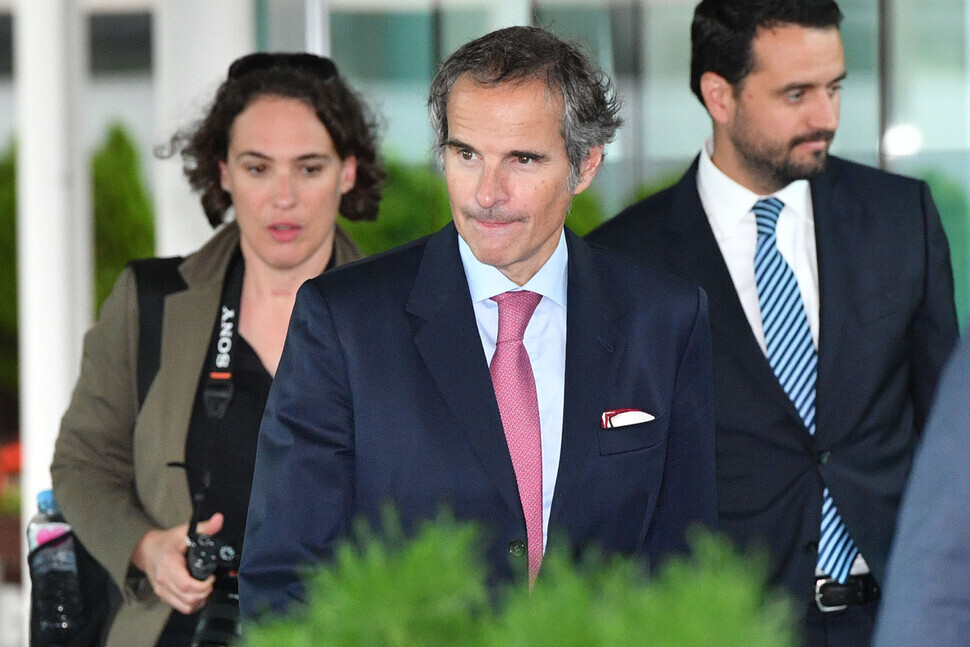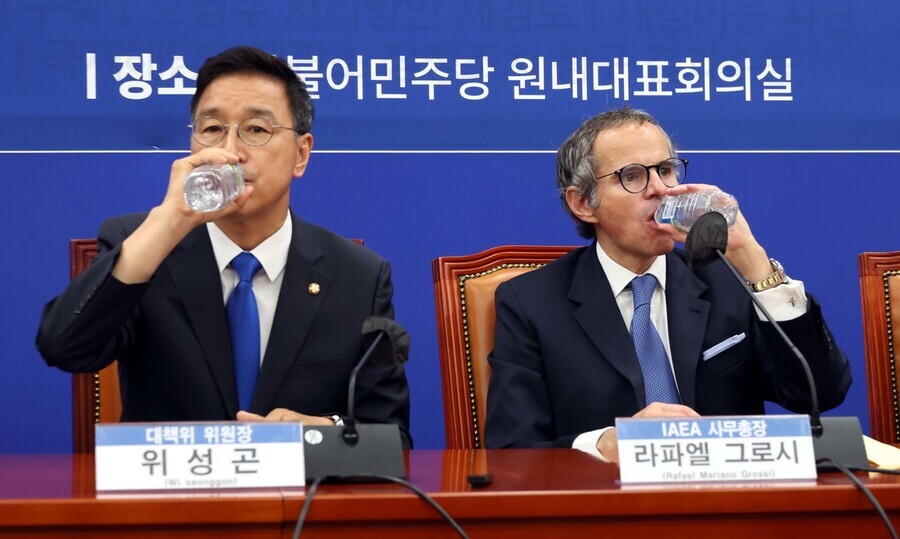hankyoreh
Links to other country sites 다른 나라 사이트 링크
IAEA chief’s visit to Korea fails to quell concerns about Fukushima wastewater dumping

The chief of the International Atomic Energy Agency (IAEA) pledged on Sunday that his agency will establish a permanent office in Fukushima to monitor the process of discharging contaminated water from the ruined Japanese nuclear power station there.
Amid continued controversy over the credibility of the IAEA’s final report released last week, the agency’s Director General Rafael Grossi is now traveling to countries that have voiced strong opposition to the dumping, including South Korea, to communicate with and reassure those with concerns about the plan.
Grossi’s tour, however, has done little to quell criticism from opposition parties and civil society organizations in Korea which claim that the IAEA’s justification for discharging contaminated water into the ocean is a “clear violation” of the rights of neighboring IAEA member states.
On Sunday, Grossi met with members of a Democratic Party committee for blocking the dumping of the irradiated water into the ocean, where he stated that he “wholeheartedly” understood various worries and concerns. He further vowed that the IAEA will reside permanently in Japan and spend decades there to review every aspect of the process and function of the discharge of contaminated water to ensure that it meets international safety standards.
Sunday’s meeting came at the request of the Democrats. Grossi arrived in South Korea on Friday night to rowdy protests following controversy over the neutrality of the IAEA’s final report, which was released on July 4.
He met with government officials and local media on Saturday before sitting down with the Democratic Party lawmakers.
“I would like to emphasize that the release of the treated water stored at Fukushima Daiichi Power Station is a national decision by the Government of Japan and that this report is neither a recommendation nor an endorsement of that policy,” Grossi wrote in a foreword to the comprehensive report recently released by his agency.
However, throughout his visit to Korea Grossi made comments that appeared to actively defend the discharge, such as calling the contaminated water treated by the ALPS just “water” and claiming that, “You can drink [the water] and swim in it, too,” in an interview with some Korean media, including the Chosun Ilbo, on Saturday.

In response to opposition to the release of contaminated water by fishers in Fukushima, he said in an interview with the Hankook Ilbo, “If the water is safely treated and released, there will be no contamination of seafood.”
“What the fishermen are worried about is not the ‘science’ behind the discharge, but their own ‘reputation,’” he said.
The implication is that Japanese fishers are not looking for scientific proof of safety, but rather fear that Fukushima fish will bear the stigma of the contaminated water.
He also dismissed the IAEA’s original plan by stating that the agency “doesn’t have to check everything,” in response to criticism about the fact that the final report was released with only preliminary results from the analysis of contaminated water samples.
He also waved away questions about the IAEA’s neutrality as coming from “people who don’t like nuclear power.”
Instead of holding a public press conference as originally discussed, Grossi gave individual interviews to five media organizations. In addition, his meetings with Yoo Guk-hee, the chairperson of South Korea’s Nuclear Safety and Security Commission, and Foreign Minister Park Jin on Saturday afternoon were also held behind closed doors, without informing the media of the schedule.
Meanwhile, the government said that in its meeting with Grossi on Saturday, it requested that South Korean organizations and experts be allowed to participate in the IAEA’s follow-up verification of Japan’s discharge of contaminated water into the ocean.
Grossi responded to Yoo’s request by saying he would “look into ways to make that possible,” according to the commission.
Because the meeting was held behind closed doors, it is unclear what exactly was discussed between Grossi and the government.
Park, who met with Grossi the day before, told reporters only that they “had in-depth discussions on how to cooperate with the International Atomic Energy Agency to verify the scientific safety of the release of contaminated water into the ocean and reassure the public.”
By Kim Jeong-su, senior staff writer; Key Min-do, staff reporter; Shin Hyeong-cheol, staff reporter; Lee Woo-yun, staff reporter
Please direct questions or comments to [english@hani.co.kr]

Editorial・opinion
![[Column] How tragedy pervades weak links in Korean labor [Column] How tragedy pervades weak links in Korean labor](https://flexible.img.hani.co.kr/flexible/normal/500/300/imgdb/original/2024/0703/8717199957128458.jpg) [Column] How tragedy pervades weak links in Korean labor
[Column] How tragedy pervades weak links in Korean labor![[Column] How opposing war became a far-right policy [Column] How opposing war became a far-right policy](https://flexible.img.hani.co.kr/flexible/normal/500/300/imgdb/original/2024/0702/5017199091002075.jpg) [Column] How opposing war became a far-right policy
[Column] How opposing war became a far-right policy- [Editorial] Korea needs to adjust diplomatic course in preparation for a Trump comeback
- [Editorial] Silence won’t save Yoon
- [Column] The miscalculations that started the Korean War mustn’t be repeated
- [Correspondent’s column] China-Europe relations tested once more by EV war
- [Correspondent’s column] Who really created the new ‘axis of evil’?
- [Editorial] Exploiting foreign domestic workers won’t solve Korea’s birth rate problem
- [Column] Kim and Putin’s new world order
- [Editorial] Workplace hazards can be prevented — why weren’t they this time?
Most viewed articles
- 110 days of torture: Korean mental patient’s restraints only removed after death
- 2In the blink of an eye, an unthinkable crash turned a night out into a nightmare
- 3Experts cast doubt on driver’s claim that sudden unintended acceleration caused deadly crash
- 4[Column] How tragedy pervades weak links in Korean labor
- 5[Column] How opposing war became a far-right policy
- 6Car behind deadly crash began rapid acceleration after exiting underground garage
- 7At shareholders' meeting, Hankyoreh renews commitment to the public
- 8Families, friends mourn loved ones cut down in prime in deadly car crash
- 9Hyundai Motor sets up one-stop shop for EV production in Indonesia
- 10Enough trash-slinging — it’s time to pursue ‘strategic communication’